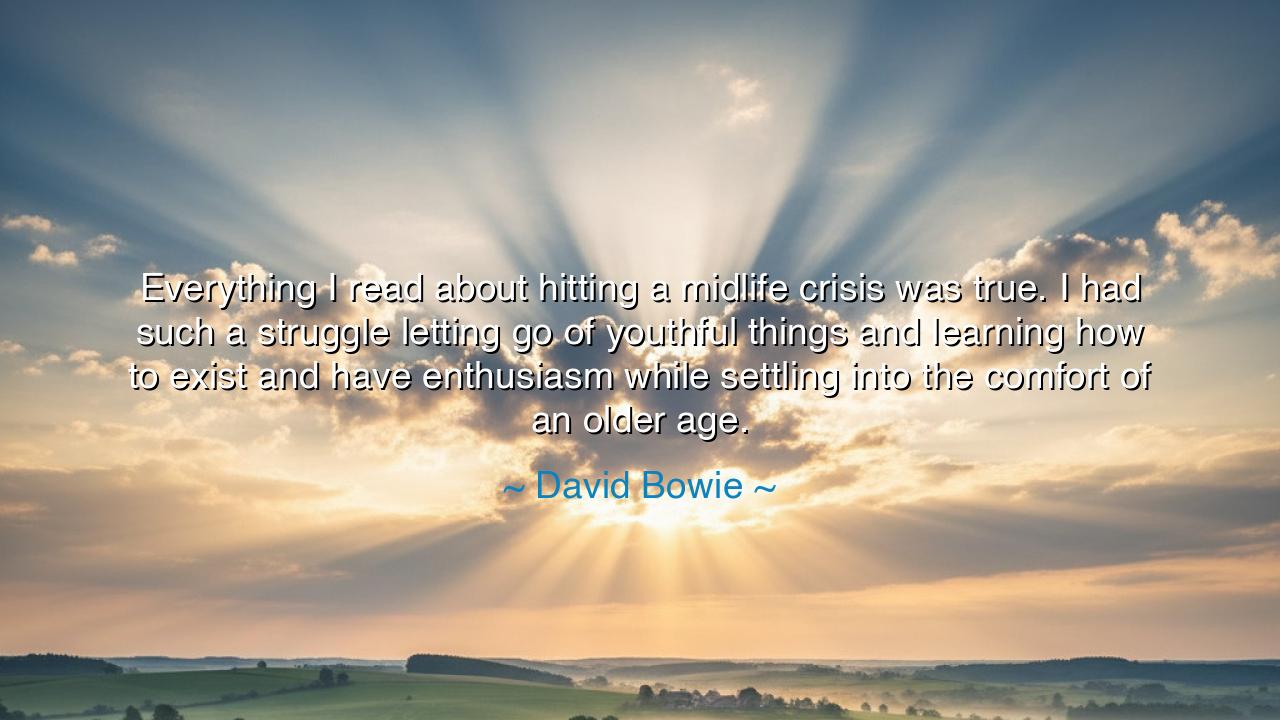
Everything I read about hitting a midlife crisis was true. I had
Everything I read about hitting a midlife crisis was true. I had such a struggle letting go of youthful things and learning how to exist and have enthusiasm while settling into the comfort of an older age.






When the starlight of youth begins to dim, and the fire of early dreams burns lower but steadier, David Bowie—the eternal chameleon of art and being—spoke with the wisdom of one who had walked through many selves: “Everything I read about hitting a midlife crisis was true. I had such a struggle letting go of youthful things and learning how to exist and have enthusiasm while settling into the comfort of an older age.” In these words lies not despair, but revelation. They speak to the ancient rhythm of human life—the tension between change and acceptance, between the burning brilliance of youth and the quiet radiance of maturity.
To face a midlife crisis is not a modern illness, though the phrase belongs to our age. It is as old as consciousness itself. The Greeks called it metanoia—a turning of the soul. It comes when one realizes that life is not an endless ascent, but a great circle, a passage through seasons. In youth we reach outward, grasping for creation, love, recognition, adventure. But in midlife, the soul turns inward, asking not what will I become? but what have I become? The struggle to let go of youthful things, as Bowie confesses, is the struggle to die a little—to release the illusion that we can forever remain at the crest of the wave. Yet in that letting go lies the seed of true wisdom.
In this, Bowie joins the lineage of seekers who faced the twilight of self and emerged transformed. Consider the story of Prince Siddhartha, who, after years of pleasure and privilege, saw at last the frailty of human life—the old, the sick, the dying—and felt his spirit fracture. He abandoned the pleasures of youth to seek enlightenment beneath the Bodhi tree. Like Bowie, he faced the truth that enthusiasm must be reborn in a deeper form, not drawn from novelty but from understanding. The comfort of older age can be a prison, yes—but it can also be a sanctuary, if one learns to dwell within it consciously, gratefully, and with renewed purpose.
Bowie’s life itself was an ever-changing mirror of this transformation. He reinvented himself ceaselessly—Ziggy Stardust, the Thin White Duke, the artist in Berlin, the elder poet of Blackstar. His confession of struggle is not weakness—it is courage. For to admit that one must learn how to exist anew is to stand on the threshold of rebirth. The midlife passage is not the end of creation, but its metamorphosis. The young create to discover themselves; the mature create to express what they have found.
There is a profound sacrifice in aging. Youth gives us speed, beauty, and restlessness—but maturity grants depth, clarity, and compassion. The fire of youth burns high, but it burns out quickly; the hearth-fire of wisdom burns lower but endures through the long night. The challenge, as Bowie names it, is to keep enthusiasm alive—to find wonder not in novelty but in meaning, not in chasing the next horizon but in seeing new light on familiar shores. This is the sacred art of aging: to shift the source of joy from becoming to being.
From this truth arises a lesson for all who walk the middle path of life. Do not mourn the fading of youth as a loss—it is a transformation, a changing of fuel. The same passion that once drove you to chase dreams can now deepen into presence, into gratitude, into mastery. The comfort of older age need not dull your soul; it can nourish it, if you fill it with reflection, creation, and service. The tree that once reached upward now spreads its branches wide, offering shade and fruit to others.
So, O traveler of years, take Bowie’s confession as a mirror of your own pilgrimage. Do not fear the ebb of youth; welcome it as the tide that reveals new depths of the shore. Let go of what no longer serves your spirit, but never cease to cultivate enthusiasm—for enthusiasm is the spark of the divine that transcends age. Renew it through curiosity, art, learning, and love. In doing so, you will discover that the second half of life, far from decline, is the true beginning of wisdom.
Thus, the ancient truth endures: the soul must shed its old garments to wear the cloak of eternity. Youth fades, but consciousness expands. To live well is to learn how to change shape, as Bowie did—to meet each new age not with regret, but with reverence.






AAdministratorAdministrator
Welcome, honored guests. Please leave a comment, we will respond soon